Services
Gloucestershire Community Dental Service
The Community Dental Service comprises the Special Care and Paediatric Referral Service, Intermediate Minor Oral Surgery, General Dental Service and Out of Hours urgent Gloucestershire dental care.
Information on all our services can be found below.
On this page

About Us
The Special Care and Paediatric Referral Service is different from a High Street dental practice. Most of our patients are referred to our service for appropriate care.
We work in partnership with patients, families, carers and health and social care professionals to promote oral health and provide appropriate NHS dental care for people who cannot be treated in general dental practice.
Our patients have physical and/or learning disabilities, mental health, emotional and/or sensory conditions, or a combination of these factors.
We promote oral health, provide access to appropriate clinical care and enable equitable opportunities for good oral health.
Dental team
The team comprises dentists, dental therapists/hygienists, dental nurses and oral health educators, who all work together to ensure a patient’s oral health needs are met and they maintain a healthy mouth.
The clinical team are supported by a number of staff, including receptionists and administrators, who help maintain patient records and ensure that appointments are booked efficiently.

Dentist
- educate patients on oral healthcare
- examine teeth and diagnose dental conditions
- assess treatment options and agree treatment plans with patients
- carry out agreed clinical treatments such as restoring teeth affected by decay and treating gum disease
- maintain patients’ dental records
Dental therapist
A dental therapist will work to a dentist’s prescription for treatment and see patients, accompanied by a dental nurse in surgery, or in a patient’s place of residence. A therapist will:
- educate patients on oral healthcare
- place sealants
- scale and polish teeth
- work with patients to manage gum disease
- carry out treatments such as fillings and extractions
In this short film, dental therapist Katherine offers patient Alfie toothbrushing and diet advice.
Dental nurse
The dental nurse supports all members of the dental team, both in surgery and in a patient’s place of residence. A dental nurse will:
- assist the dentist during an examination or treatment
- help the dentist to make the patient feel comfortable and at ease
- be responsible for maintaining a patient’s record, including taking notes while the dentist is examining the patient
- maintain a high standard of cleanliness in surgery and ensure it is ready for use
Many of the dental nurses working within our service have further qualifications in radiography, inhalation sedation and special care.
Oral health educator
An oral health educator will work with patients and carers to provide them with the skills and knowledge required to maintain a healthy mouth.
An oral health educator will:
- educate patients on oral healthcare using various visual aids
- provide advice and teach brushing techniques
- advise on diet and snacking
- educate carers so that they can maintain oral health for their family member or patient, including caring for dentures
- apply fluoride
Dental receptionist
The reception team is the first point of contact for our patients. They welcome patients and complete any paperwork necessary prior to them being seen by a clinician. They also assist patients in making appointments for their examinations and treatment.
Administrators
The administration team carry out various clerical tasks, such as managing the referral process and patient records.
Our services
The Special Care and Paediatric Referral Service provides care for patients who are unable to receive dental treatment at a regular family dental practice.
The dental team aim to achieve optimal oral health so that patients with special care needs experience a healthy, functional and pain-free mouth. We provide practical support and guidance to patients, families, carers and other professionals, continually seeking to improve the patient experience.
Intermediate Minor Oral Surgery
Provision of the Intermediate Minor Oral Surgery Service (IMOS) is part of the Community Dental Service.
IMOS is a referral service for patients requiring Level 2 care – i.e. care provision from a clinician with enhanced skills and experience on a specialist level.
The IMOS provides Level 2 oral surgery procedures which are beyond the scope of mandatory services, as defined by NHS GDS contract and PDS agreement regulations.
Referral criteria
The referral criteria includes:
Level 2 oral surgery procedures for patients (adult -18 years old) that have demonstrated they are able to accept dental care in general dental services. However, it is the complexity of the minor oral surgical procedure that is the reason for the referral.
This excludes:
- Patients unable to accept treatment under local anaesthetic alone due to dental anxiety – for example, requiring treatment under sedation or general anaesthetic
- Children (under 18 years of age)
- Patients with special care needs who are unable to accept treatment under local anaesthetic alone (please consider referral to the Special Care Dental Service)
Minor oral surgery procedures:
- Surgical removal of uncomplicated third molars involving bone removal, excluding third molars that appear to have signs of intimacy with the corresponding Inferior Dental Canal on plain film radiography, as we do not have access to three-dimensional imaging
- Surgical removal of buried roots and fractured or residual root fragments
- Exposure of palpable or superficial impacted teeth/removal of teeth for orthodontic treatment if the patient is over 18 years of age.
Patients referred have been assessed as ASA I and ASA II (using the American Society of Anaesthesiologist physical status classification system), with no significant medical history that cannot be managed in general dental services.
This includes patients on oral antiresorptive medications and patients taking anticoagulant and antiplatelet medications. Please provide details of the medications, frequency of therapy, indication for therapy and duration of therapy.
We are unable to accepts referrals for treatment requiring access to histopathological diagnostic services. This includes incisional and excisions biopsies, apicectomies and cyst enucleation.
Please note, we do not have facilities for facial reconstruction plate and screw removal.
Referrals will be accepted using the IMOS e-referral form only (see below). Please note, this form is different from the Special Care/Paediatric e-referral form.
E-referrals will be triaged by the IMOS Performer and a decision will be made on whether or not the patient meets the acceptance criteria for the service.
Where the e-referral does not meet the criteria, it will be returned electronically to the referrer with appropriate feedback.
Facilities
We have specialist equipment at various locations in Gloucestershire. This helps facilitate treatment for patients with additional needs.
Bariatric dental chair
It is important that patients feel comfortable and supported while receiving their dental treatment. We have bariatric facilities at our clinics in Gloucester, Stroud and Cheltenham.
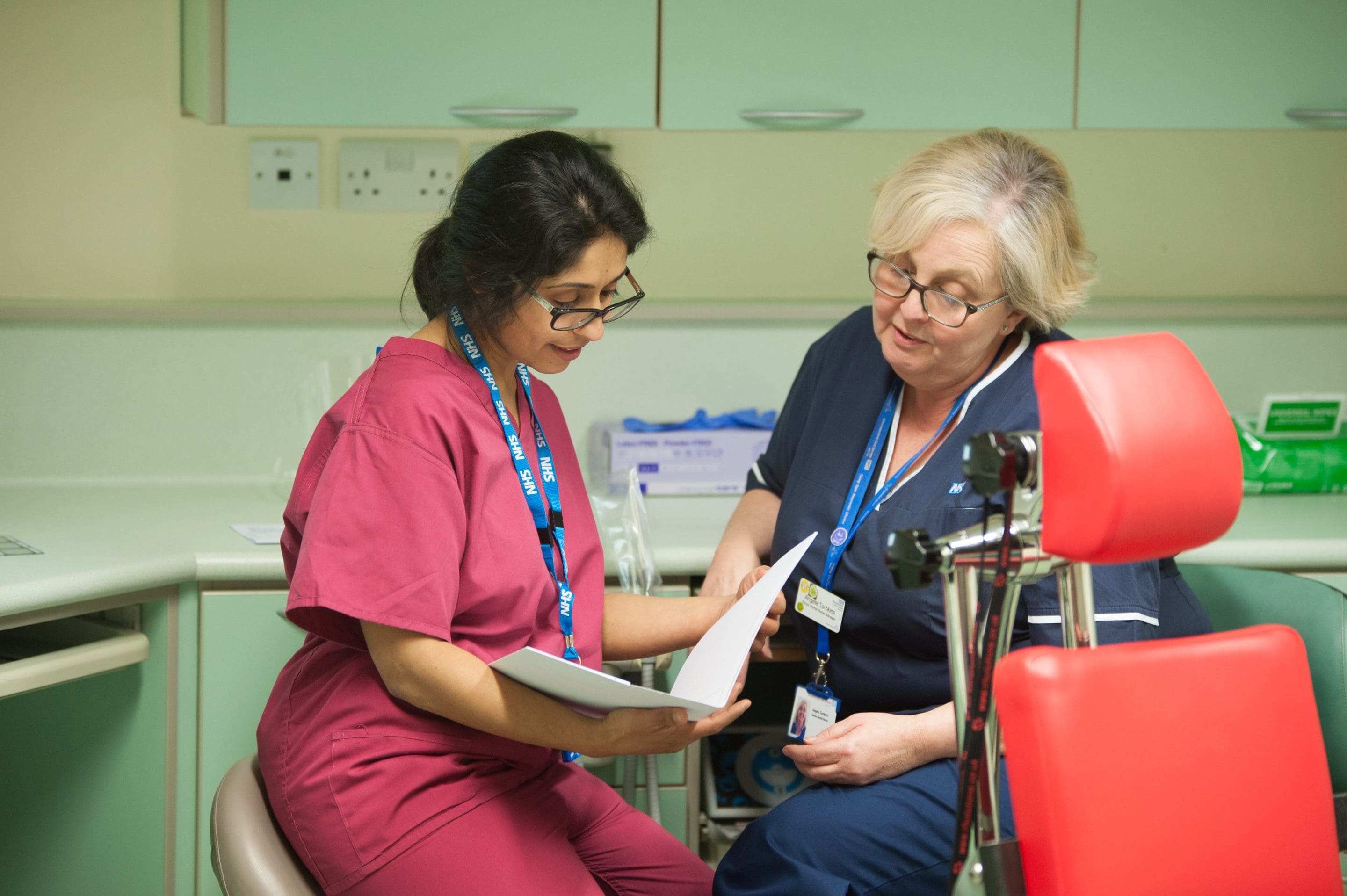
General anaesthetic
Very young children and patients with special needs may not be able to receive routine dental care, such as extractions, in the dental surgery in the normal way. It may be necessary for treatment to be performed under general anaesthesia.
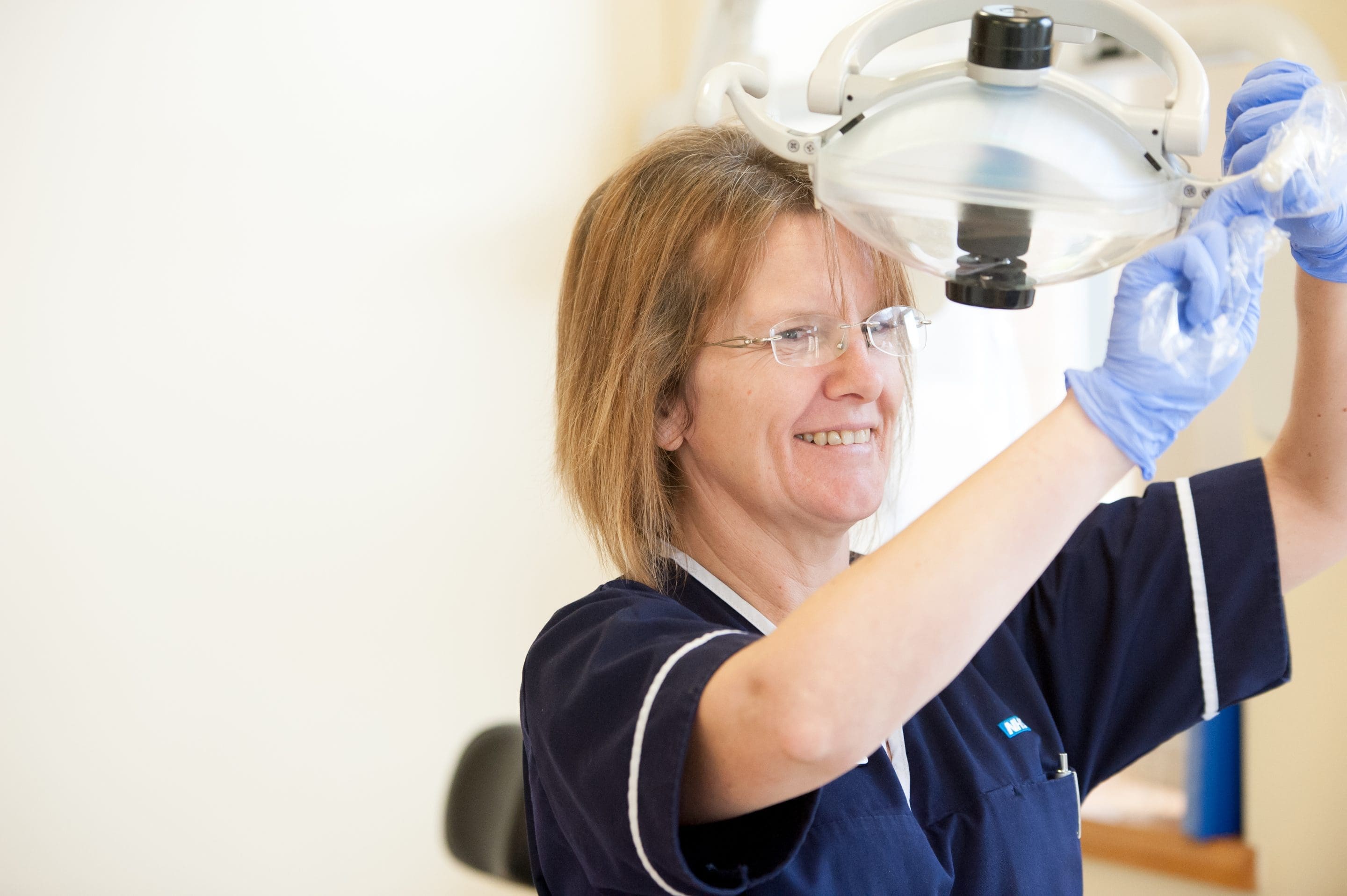
Inhalation sedation
We are able to offer dental treatment with inhalation sedation for children and adults who experience dental anxiety. Patients are usually referred to our service by their dentist and must meet our acceptance criteria.
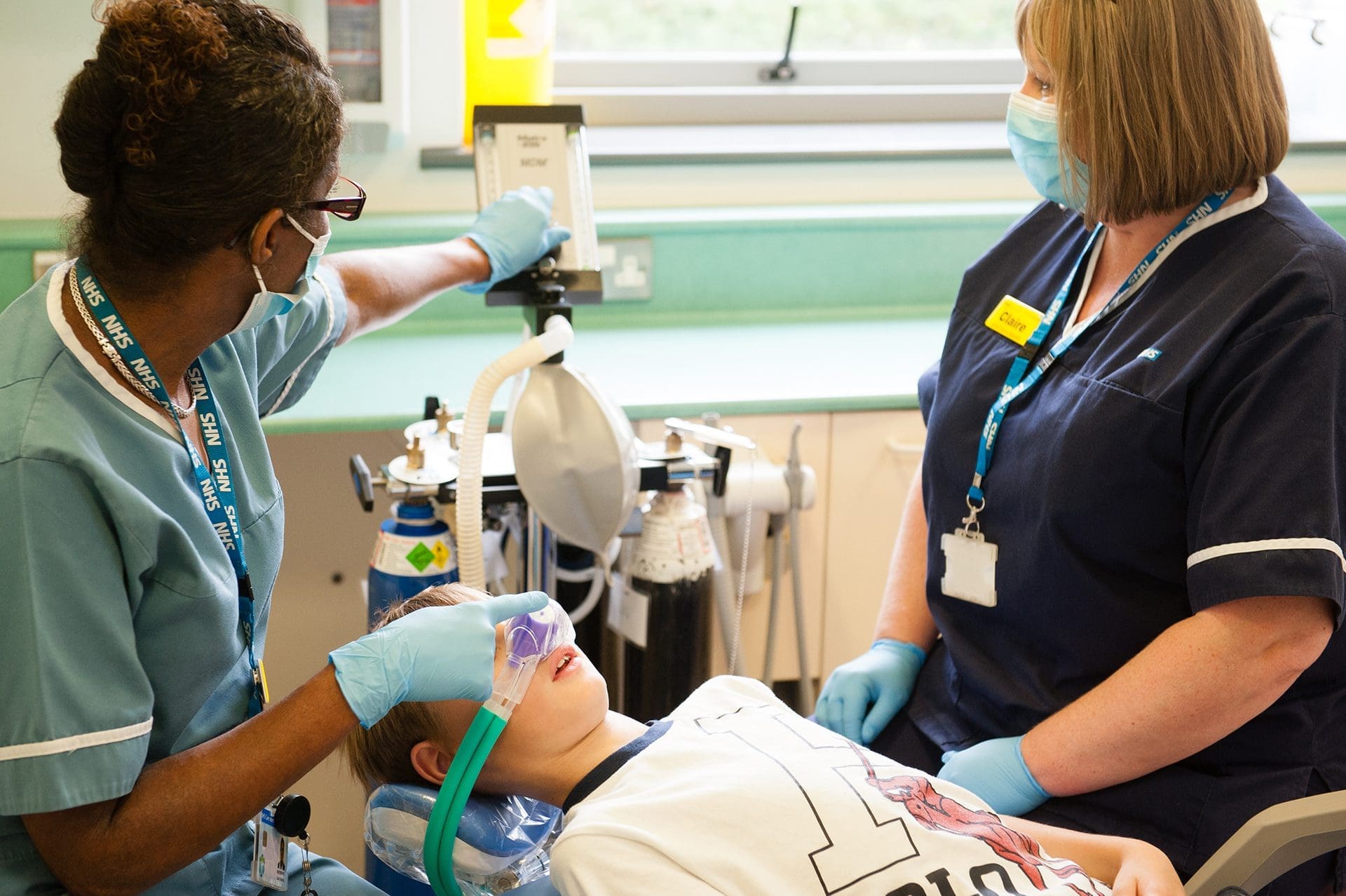
In this short film, Senior Dental Officer Leah Adams explains the process involved when using inhalation sedation to help people feel more relaxed and calm when undergoing treatment.
Panoral radiographs - X-ray
We provide a panoramic X-ray machine that takes a two-dimensional image of the entire mouth. It is quicker to take than a traditional dental X-ray, the image is clearer and it can benefit a lot of our patients.
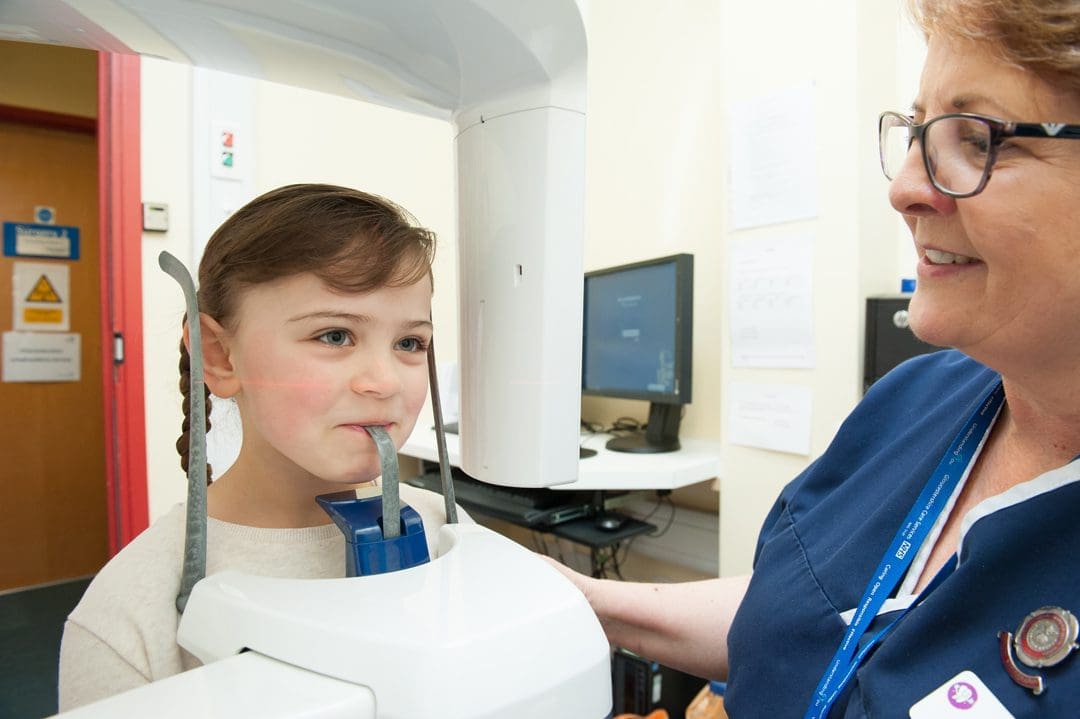
The Wand
The Wand is an injection system which replaces the traditional syringe. Using computerised technology, the Wand delivers a supply of anaesthetic in a slow, comfortable manner.
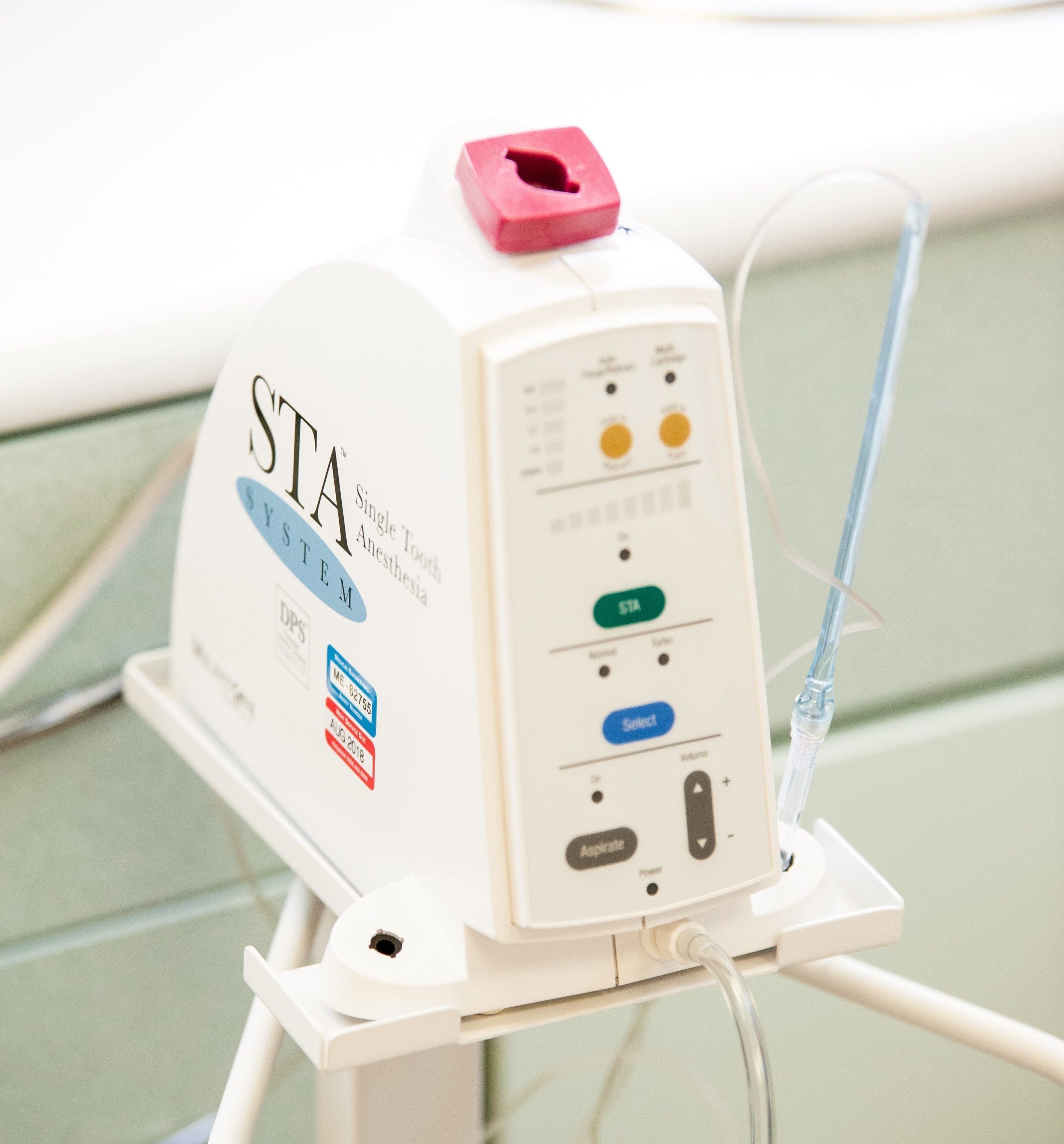
Wheelchair recliner
Patients who are unable to transfer to a dental chair and do not use a wheelchair which can be reclined, can be treated in surgery at our clinics in Gloucester, Stroud and Cheltenham.
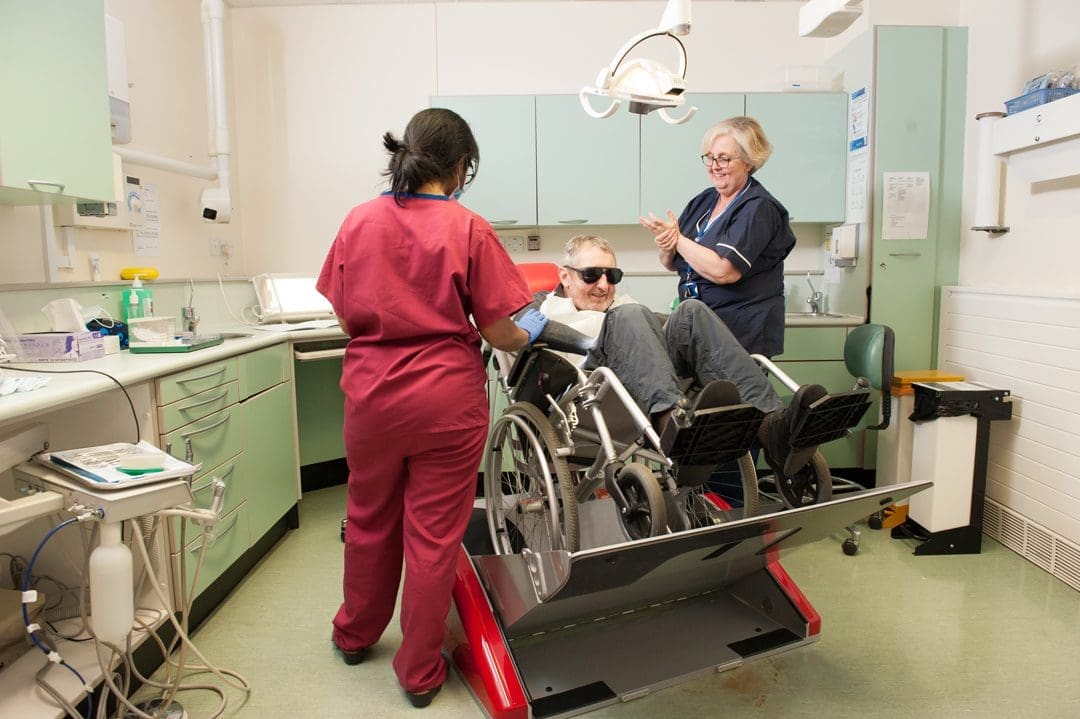
In this short film, wheelchair user Jane discovers how the recliner makes it so much easier for her to receive dental treatment.
Referrals
As a small, specialist-led service, unfortunately we are unable to accept patients experiencing access issues to NHS dentistry.
If you feel that you or someone you care for would benefit from being treated within our service, please discuss a referral with your dentist or other healthcare professional.
Referrals will be triaged, but patients may still not be accepted until a clinical assessment has been carried out. It is important that patients who are referred are made aware of this.
You may be caring for someone who is housebound / bedbound and unable to leave their residence for any reason i.e. doctor appointments, hairdresser / barber, podiatry or social occasions etc. Referrals will be accepted from individuals, family members, carers or healthcare professionals for people who meet our strict acceptance criteria. Please see domiciliary ‘home’ visits.
Referral criteria
Adult special care referral criteria
Table 1: Acceptance and exclusion criteria for adult special care dentistry
| Special care group | Acceptance criteria | Exclusion criteria |
| Learning disability |
Limited verbal communication due to cognitive or sensory impairment. Learning difficulty severely impacts on the patient’s ability to accept dental care. Capacity to consent is impaired; clinician may be required to make best interest decision. Requires assistance to carry out and maintain oral hygiene. |
Mild learning disability where patient requires only reasonable adjustment in terms of time, equipment or facilities to accept care. |
| Physical disability |
Unable to weight bear or transfer to dental chair. Requires risk assessment and/or specialist equipment, e.g. wheelchair tipper. Has communication, sensory, or cognitive impairment impacting on capacity to consent. Requires assistance to carry out and maintain oral hygiene. |
Wheelchair users who can transfer into dental chair, people who have difficulty with stairs – alternative ground floor accessible NHS practices are available. |
| Medical disability |
Complex medical history which impacts either directly on oral health or ability to receive care. Medical conditions which are not stable or well controlled, which require treatment with medical specialist advice. Progressive, degenerative medical or disabling condition, e.g. motor neurone disease, dementia. Has communication, sensory or cognitive impairment. |
Blood borne virus: Hep B, C. Anticoagulant therapy with a stable INR below 4.0. For further guidance please consult the Scottish Dental Clinical Effectiveness Programme – Management of Patients taking Anticoagulents and Anti-platelet Drugs August 2015. Medical conditions which are stable and controlled by medication e.g. epilepsy, hypertension, diabetes, asthma, HIV. Patients for whom medical specialists have advised there are no additional concerns for safety in relation to the provision of dental care in practice. |
| Mental health |
Complex psychiatric condition requiring support from mental health team. Extreme mood or cooperation problems. Has communication or cognitive impairment impacting on capacity to consent. Requires assistance to carry out and maintain oral hygiene |
Mental health condition managed with GP-prescribed medication, e.g. depression. |
| Socially excluded |
Homeless/drug dependent who require an outreach service to facilitate access. |
Able to accept care within general dental service. People whose first language is not English and who require a translator – translation services are available for NHS patients to facilitate care within the dental practice setting. |
| Domiciliary care |
People confined to bed 24 hours per day. Hospital inpatient. People with a medical, physical or mental health condition which requires assessment to take place in a non-clinical setting. |
People who are able to attend GP and hospital appointments, or social outings. People who are able to travel with assistance, e.g. wheelchair-friendly transport.
|
Discharge
Patients with a learning disability, physical disability and mental health problems are by definition, vulnerable adult groups. Following an initial course of treatment, patients may be offered regular ongoing care within the Community Dental Service if, due to their special needs, they are not able to access care from a general dental practitioner.
If, however, management of routine regular care, e.g. dental examinations, preventive advice and simple treatments, is possible with carer support, these patients may be referred back into the general dental surgery.
A shared care arrangement with a specific general dental practitioner may be appropriate for some patients.
Adults with severe dental anxiety or dental phobia
Many adults express feelings of anxiety associated with dental treatment, but most can be managed within general dental practice with extra time allowed and a sympathetic approach.
Gloucestershire Community Dental Service offers a referral service for adult patients for whom provision of routine care has been attempted within general practice but has not been successful. This would be for one course of treatment only, and patients will only be accepted for care providing ALL of the referral criteria have been met.
Acceptance criteria for phobic patients
- The patient has expressed severe anxiety or phobia about dental treatment.
- The patient’s anxiety/phobia has prevented them from accepting dental care within general dental practice.
- The referring dentist has attempted to provide dental treatment on more than one occasion.
- The referring dentist can describe procedures that have already been attempted without success.
- The patient is ready to have their anxiety/phobia addressed.
- The patient understands that they may be managed by a variety of techniques including behavioural therapy or inhalation sedation.
- The patient is willing to complete a dental anxiety questionnaire prior to being accepted for dental services – this will be sent by post to the patient’s home address or by email.
- The referring dentist will consider accepting the patient for routine ongoing care and preventive advice following care within this service.
Gloucestershire Community Dental Service may be able to provide clinical services which include examination, scaling, routine restorations and extractions, providing patients meet the required criteria.
Inhalation sedation may be provided for patients who are assessed as ASA1 or ASA2.
Children special care referral criteria
Table 2: Acceptance and exclusion criteria for paediatric special care dentistry
| Special care paediatric groups | Acceptance criteria | Exclusion criteria |
|
Medically compromised
|
Complex medical history which impacts either directly on oral health or ability to receive care. Medical conditions which are not stable or well controlled, which require treatment with medical specialist advice. Progressive, degenerative medical or disabling condition. Conditions requiring PEG feeding. May also have communication, sensory or cognitive impairment. |
Medical conditions which are stable and controlled by medication, e.g. epilepsy, diabetes, asthma. |
| Physical disability | Physical disability preventing access to dental practice or requiring specialist equipment. | Wheelchair users who can transfer into dental chair, people who have difficulty with stairs – alternative ground floor accessible NHS practices are available. |
| Learning Disability |
Moderate to severe learning disability. Limited verbal communication due to cognitive or sensory impairment. Unable to cooperate with dental examination in the dental chair. |
Mild learning disability where patient requires only reasonable adjustment in terms of time, equipment or facilities to accept care. |
Table 3: Acceptance and exclusion criteria for routine paediatric patients
Some children have particular difficulty in accepting dental care, or are especially vulnerable due to certain social circumstances. The Community Dental Service can accept routine paediatric patients for care who fulfil the following criteria.
| Routine paediatric Care | Acceptance criteria | Exclusion criteria |
| Vulnerable children |
Child In need or child subject to child protection plan. Child under care of temporary foster parents. Looked-after children. |
Children in stable social circumstances where there are no issues with parental responsibility. |
| Behaviour problems |
Associated with diagnosed ADHD or autism. Delayed emotional development. |
Children who may be managed with reasonable adjustment in terms of time for appointment. |
| Dental anxiety |
Very young children requiring extractions under general anaesthetic. Children with extreme dental anxiety who have proven inability to cooperate with routine dental treatment. |
Children for whom no routine preventive measures or treatment have been attempted. Routine or emergency dental care for healthy, cooperative children. Children simply presenting with a high level of treatment need. Root canal treatment in permanent molars. Orthodontic extractions under general anaesthetic.
|
| Developmental dental conditions, e.g. amelogenesis and dentinogenesis imperfecta, cleft lip or palate | Only accepted where additional special care need exists, e.g. learning disability, complex medical condition. | Where specialist advice is required, a referral to specialist paediatric dental service would be appropriate e.g. dental hospital. |
Orthodontic assessment
We do not provide any orthodontic services and so are unable to accept referrals for orthodontic assessment or treatment. Children likely to require extraction of permanent teeth, e.g. decayed first permanent molars, will ideally require an orthodontic specialist opinion to ensure that the best possible long-term result is achieved for the developing dentition. This is especially important where a general anaesthetic is required. It is the responsibility of the referring dentist to ensure this is undertaken prior to referral, so that the need for any additional balancing or compensating extractions is considered.
Discharge
Where possible, we aim to provide acclimatisation and one course of treatment, after which routine paediatric patients will be referred back to the referring dentist for ongoing care.
Children requiring special care dentistry who meet the referral criteria due to the nature of their disability or impairment, may be offered ongoing care within the Community Dental Service.
Children who may be considered a safeguarding risk may also be offered ongoing care until a referral into the general dental service becomes achievable and appropriate.
Inhalation sedation and general anaesthetic services for children
Inhalation sedation can be a useful adjunct when providing care for the nervous and anxious child. However, to be successful, this still requires a certain level of understanding and cooperation from the patient. For this reason very young children are not routinely offered sedation and other behaviour management options are explored in the first instance.
The suitability of a patient for inhalation sedation is based on the assessment of the individual patient’s needs and not on the demands of the parents. It would be appreciated if referring clinicians can explain this to parents to reduce the expectation that an extensive course of restorative care is possible under inhalation sedation in this age group.
The paediatric general anaesthetic service can only provide exodontia for routine, healthy children; there is no facility for restorative work to be completed at the same time. All restorative work possible should be completed ideally prior to a referral for general anaesthetic.
Assessment and treatment planning for a general anaesthetic appointment will be carried out to ensure that all unrestored, decayed teeth and teeth of poor prognosis are removed, reducing the likelihood of the need for a repeat general anaesthetic in the future.
Please note that general anaesthetic is not available for orthodontic extractions prior to active treatment, unless there is a special care requirement.
Information for professionals
If you are a general dental practitioner or healthcare professional, you can find out more about our criteria for referring patients below.
Information for professionals
The role of the Gloucestershire Community Dental Service has developed over the last few years and we are commissioned to provide special care dentistry for adults and children in Gloucestershire. We have a central system for all referrals, which are triaged by a senior clinician prior to being accepted onto the waiting list. Patients are then offered an appointment at a clinic that has appropriate facilities for their particular needs.
The service is led by a specialist in special care dentistry, but patients will be booked with a dentist appropriate to their needs as identified within the referral. Patients should be informed they are being referred to the special care dental service.
Referral information
Many patients referred to special care dental services only require the skills of that service for some procedures, while routine examination, oral health assessment and preventative care can be managed quite satisfactorily in the general practice.
Unless patients meet the strict criteria for ongoing care within the service, they will be discharged back to the referring dentist at the end of a course of treatment.
Please be aware that should a patient fail to attend/was not brought to their assessment appointment, they will be discharged back to the referring dentist. If the referral is still required a new e-referral will need to be completed.
Gloucestershire Community Dental Service intends to operate a policy of shared care with dental practitioner colleagues, and patients may be referred back to the service if they have further similar treatment requirements at a later date.
Special care dentistry definition
The speciality of special care dentistry is concerned with the improvement of the oral health of individuals and groups in society who have a physical, sensory, intellectual, mental, medical, emotional or social impairment or disability or, more often, a combination of these factors.
Patients suitable for management within routine primary care should be treated safely and effectively and not disadvantaged through inappropriate and unnecessary referral. Unless patients fulfil strict referral criteria for ongoing care, they will be discharged back into the care of the referring dentist at the end of the course of treatment.
Referral forms
For dentistry and healthcare professionals referring their existing patients OR for domiciliary ‘home’ care requests ONLY. Access the referral form.
Locations
Contact us
Need to contact one of the team?
Visit our Contact Us page for more information.
Information for patients
Below you will find links, videos and advice for all, about looking after your teeth, your children’s teeth and for those with special needs.
Introduction to Gloucestershire Community Dental Service
Oral Health - How to look after your teeth
View fun brushing videos made with Dr Ranj – and Supertooth
Download a practical guide to children’s teeth
Download some practical advice for parents of children with autism
Watch brushing videos for patients with special needs and their carers
To find out more about Dental Check by One or to download resources that support the campaign, visit: https://dentalcheckbyone.co.uk
Watch this signed story – Peppa Pig Story – Dentist Trip – British Sign Language (BSL)/SSE
Dental anxiety in children and young people
View ‘Your teeth you are in control’ resources. Registration is free and you will get access to age-specific modules and worksheets.
View a poster with a superhero dentist to prepare children before going to the dentist during COVID19 pandemic.
Your appointment
Please note that your initial appointment might be a telephone or video consultation.
Video: Coming to your check-up
Get Checked: What to Expect at the Dentist – a film produced by Inclusion Gloucestershire
View ‘Introduction to Attend Anywhere’ short video
View a short video to explain how to send photos of your child’s teeth to the dentist
View a short video to explain how to send videos/photos of your teeth to the dentist
Easy read information
We can provide copies of the below easy read leaflets in either paper or PDF format. To request a paper copy in the post or an electronic (PDF) version via email, call us on 0300 421 6440, or email Dental.Reception@glos-care.nhs.uk
- Appointment letter
- Going to the dentist
- Having a filling in a dental chair
- Having a tooth out
- Looking after false teeth
- What is a fissure sealant?

